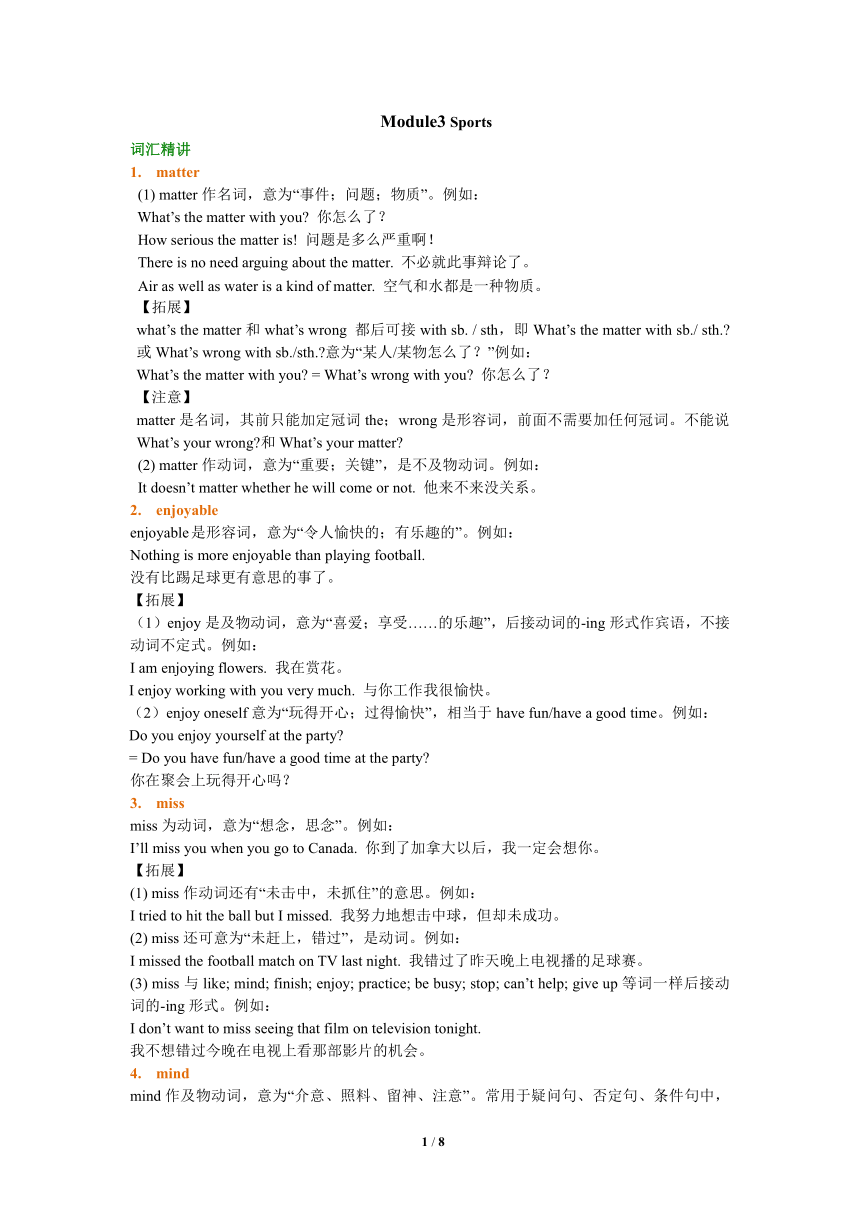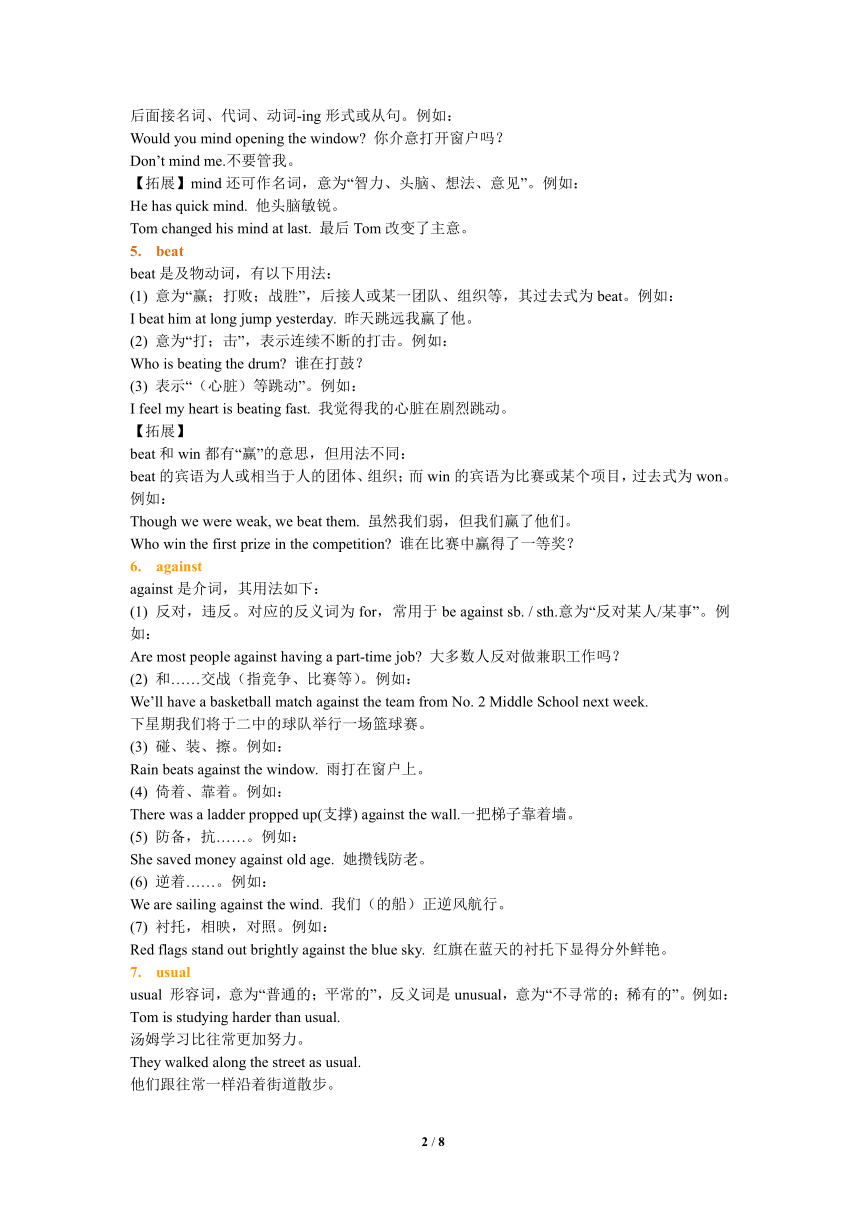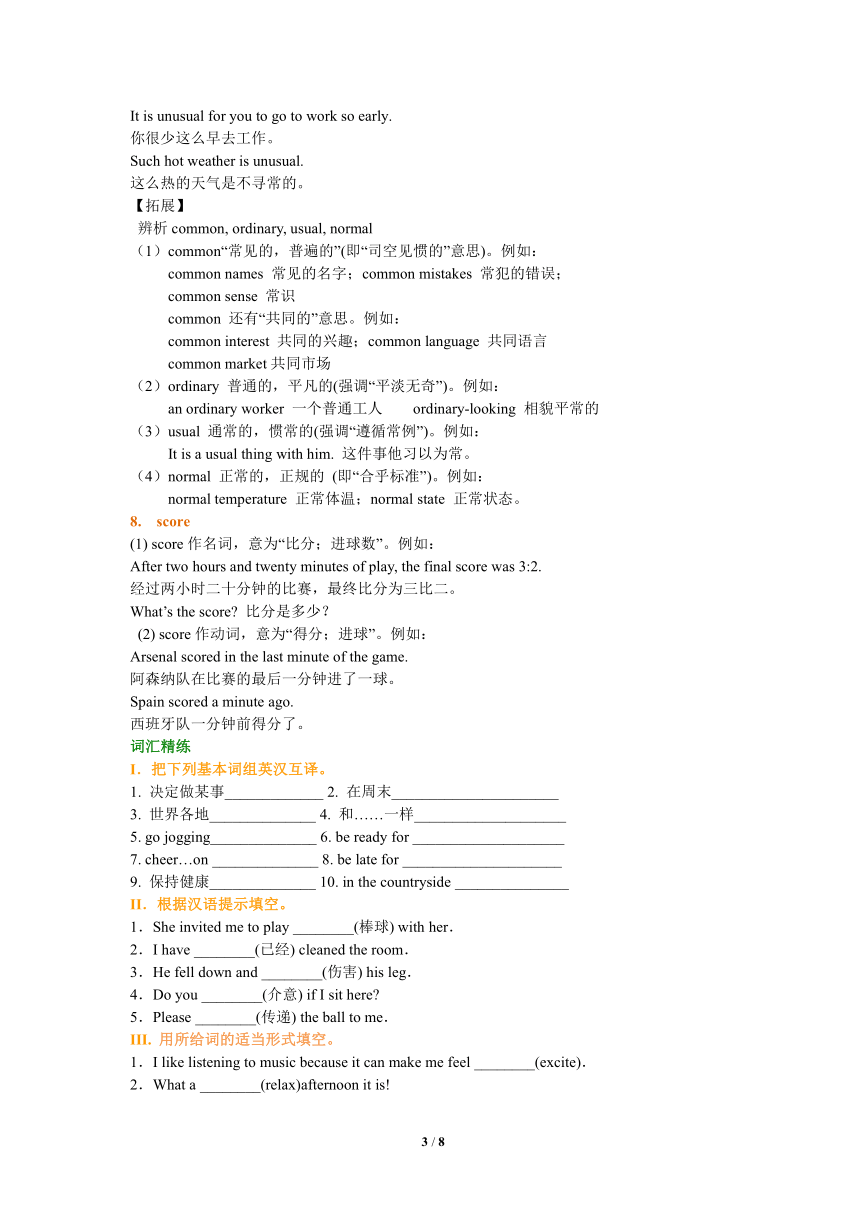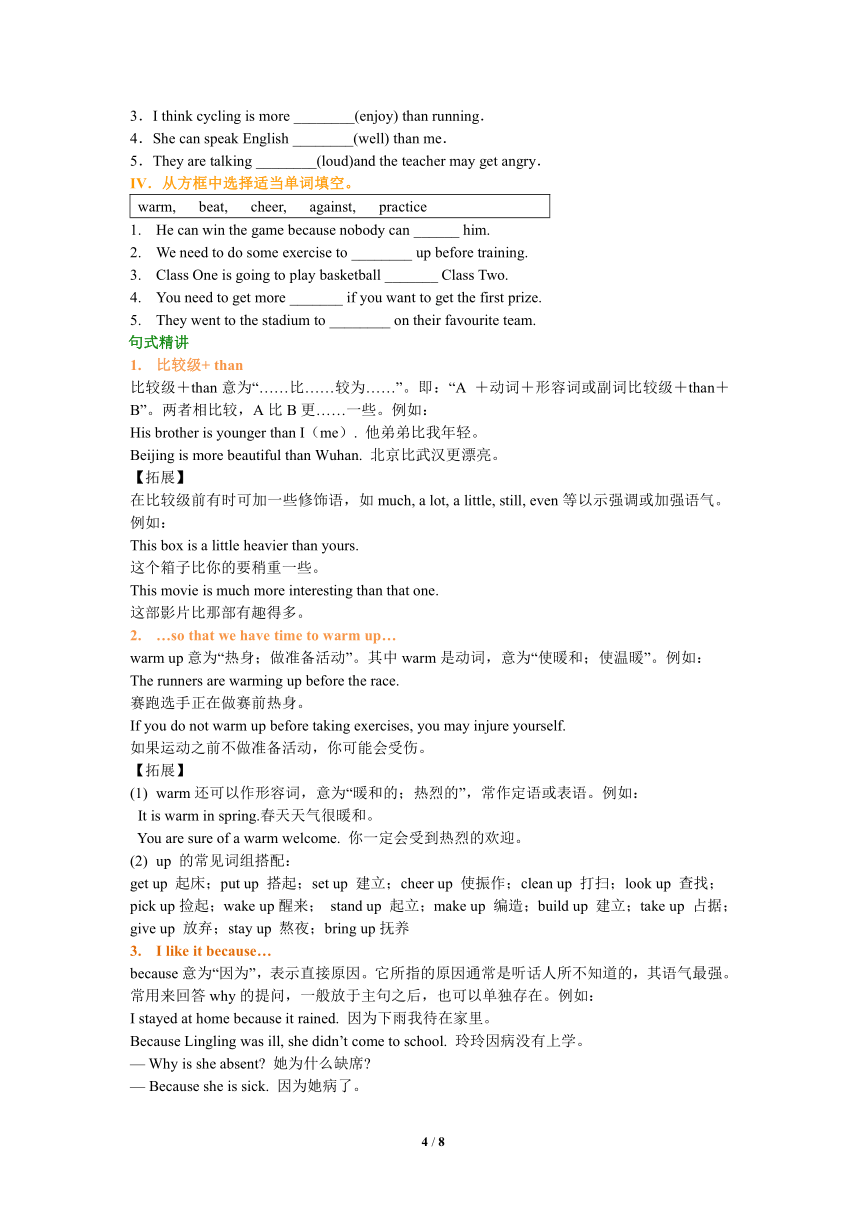外研版八年级上册 Module3Sports.词句精讲精练(word版,含同步练习和答案)
文档属性
| 名称 | 外研版八年级上册 Module3Sports.词句精讲精练(word版,含同步练习和答案) |

|
|
| 格式 | doc | ||
| 文件大小 | 70.5KB | ||
| 资源类型 | 教案 | ||
| 版本资源 | 外研版 | ||
| 科目 | 英语 | ||
| 更新时间 | 2022-06-24 10:07:34 | ||
图片预览




文档简介
Module3 Sports
词汇精讲
1. matter
(1) matter作名词,意为“事件;问题;物质”。例如:
What’s the matter with you 你怎么了?
How serious the matter is! 问题是多么严重啊!
There is no need arguing about the matter. 不必就此事辩论了。
Air as well as water is a kind of matter. 空气和水都是一种物质。
【拓展】
what’s the matter和what’s wrong 都后可接with sb. / sth,即What’s the matter with sb./ sth. 或What’s wrong with sb./sth. 意为“某人/某物怎么了?”例如:
What’s the matter with you = What’s wrong with you 你怎么了?
【注意】
matter是名词,其前只能加定冠词the;wrong是形容词,前面不需要加任何冠词。不能说What’s your wrong 和What’s your matter
(2) matter作动词,意为“重要;关键”,是不及物动词。例如:
It doesn’t matter whether he will come or not. 他来不来没关系。
2. enjoyable
enjoyable 是形容词,意为“令人愉快的;有乐趣的”。例如:
Nothing is more enjoyable than playing football.
没有比踢足球更有意思的事了。
【拓展】
(1)enjoy是及物动词,意为“喜爱;享受……的乐趣”,后接动词的-ing形式作宾语,不接动词不定式。例如:
I am enjoying flowers. 我在赏花。
I enjoy working with you very much. 与你工作我很愉快。
(2)enjoy oneself意为“玩得开心;过得愉快”,相当于have fun/have a good time。例如:
Do you enjoy yourself at the party
= Do you have fun/have a good time at the party
你在聚会上玩得开心吗?
3. miss
miss为动词,意为“想念,思念”。例如:
I’ll miss you when you go to Canada. 你到了加拿大以后,我一定会想你。
【拓展】
(1) miss作动词还有“未击中,未抓住”的意思。例如:
I tried to hit the ball but I missed. 我努力地想击中球,但却未成功。
(2) miss还可意为“未赶上,错过”,是动词。例如:
I missed the football match on TV last night. 我错过了昨天晚上电视播的足球赛。
(3) miss与like; mind; finish; enjoy; practice; be busy; stop; can’t help; give up等词一样后接动词的-ing形式。例如:
I don’t want to miss seeing that film on television tonight.
我不想错过今晚在电视上看那部影片的机会。
4. mind
mind作及物动词,意为“介意、照料、留神、注意”。常用于疑问句、否定句、条件句中,后面接名词、代词、动词-ing形式或从句。例如:
Would you mind opening the window 你介意打开窗户吗?
Don’t mind me.不要管我。
【拓展】mind还可作名词,意为“智力、头脑、想法、意见”。例如:
He has quick mind. 他头脑敏锐。
Tom changed his mind at last. 最后Tom改变了主意。
5. beat
beat是及物动词,有以下用法:
(1) 意为“赢;打败;战胜”,后接人或某一团队、组织等,其过去式为beat。例如:
I beat him at long jump yesterday. 昨天跳远我赢了他。
(2) 意为“打;击”,表示连续不断的打击。例如:
Who is beating the drum 谁在打鼓?
(3) 表示“(心脏)等跳动”。例如:
I feel my heart is beating fast. 我觉得我的心脏在剧烈跳动。
【拓展】
beat和win都有“赢”的意思,但用法不同:
beat的宾语为人或相当于人的团体、组织;而win的宾语为比赛或某个项目,过去式为won。例如:
Though we were weak, we beat them. 虽然我们弱,但我们赢了他们。
Who win the first prize in the competition 谁在比赛中赢得了一等奖?
6. against
against是介词,其用法如下:
(1) 反对,违反。对应的反义词为for,常用于be against sb. / sth.意为“反对某人/某事”。例如:
Are most people against having a part-time job 大多数人反对做兼职工作吗?
(2) 和……交战(指竞争、比赛等)。例如:
We’ll have a basketball match against the team from No. 2 Middle School next week.
下星期我们将于二中的球队举行一场篮球赛。
(3) 碰、装、擦。例如:
Rain beats against the window. 雨打在窗户上。
(4) 倚着、靠着。例如:
There was a ladder propped up(支撑) against the wall.一把梯子靠着墙。
(5) 防备,抗……。例如:
She saved money against old age. 她攒钱防老。
(6) 逆着……。例如:
We are sailing against the wind. 我们(的船)正逆风航行。
(7) 衬托,相映,对照。例如:
Red flags stand out brightly against the blue sky. 红旗在蓝天的衬托下显得分外鲜艳。
7. usual
usual 形容词,意为“普通的;平常的”,反义词是unusual,意为“不寻常的;稀有的”。例如:
Tom is studying harder than usual.
汤姆学习比往常更加努力。
They walked along the street as usual.
他们跟往常一样沿着街道散步。
It is unusual for you to go to work so early.
你很少这么早去工作。
Such hot weather is unusual.
这么热的天气是不寻常的。
【拓展】
辨析common, ordinary, usual, normal
(1)common“常见的,普遍的”(即“司空见惯的”意思)。例如:
common names 常见的名字;common mistakes 常犯的错误;
common sense 常识
common 还有“共同的”意思。例如:
common interest 共同的兴趣;common language 共同语言
common market共同市场
(2)ordinary 普通的,平凡的(强调“平淡无奇”)。例如:
an ordinary worker 一个普通工人 ordinary-looking 相貌平常的
(3)usual 通常的,惯常的(强调“遵循常例”)。例如:
It is a usual thing with him. 这件事他习以为常。
(4)normal 正常的,正规的 (即“合乎标准”)。例如:
normal temperature 正常体温;normal state 正常状态。
8. score
(1) score作名词,意为“比分;进球数”。例如:
After two hours and twenty minutes of play, the final score was 3:2.
经过两小时二十分钟的比赛,最终比分为三比二。
What’s the score 比分是多少?
(2) score作动词,意为“得分;进球”。例如:
Arsenal scored in the last minute of the game.
阿森纳队在比赛的最后一分钟进了一球。
Spain scored a minute ago.
西班牙队一分钟前得分了。
词汇精练
I.把下列基本词组英汉互译。
1. 决定做某事_____________ 2. 在周末______________________
3. 世界各地______________ 4. 和……一样____________________
5. go jogging______________ 6. be ready for ____________________
7. cheer…on ______________ 8. be late for _____________________
9. 保持健康______________ 10. in the countryside _______________
II.根据汉语提示填空。
1.She invited me to play ________(棒球) with her.
2.I have ________(已经) cleaned the room.
3.He fell down and ________(伤害) his leg.
4.Do you ________(介意) if I sit here
5.Please ________(传递) the ball to me.
III. 用所给词的适当形式填空。
1.I like listening to music because it can make me feel ________(excite).
2.What a ________(relax)afternoon it is!
3.I think cycling is more ________(enjoy) than running.
4.She can speak English ________(well) than me.
5.They are talking ________(loud)and the teacher may get angry.
IV.从方框中选择适当单词填空。
warm, beat, cheer, against, practice
1. He can win the game because nobody can ______ him.
2. We need to do some exercise to ________ up before training.
3. Class One is going to play basketball _______ Class Two.
4. You need to get more _______ if you want to get the first prize.
5. They went to the stadium to ________ on their favourite team.
句式精讲
1. 比较级+ than
比较级+than意为“……比……较为……”。即:“A +动词+形容词或副词比较级+than+B”。两者相比较,A比B更……一些。例如:
His brother is younger than I(me). 他弟弟比我年轻。
Beijing is more beautiful than Wuhan. 北京比武汉更漂亮。
【拓展】
在比较级前有时可加一些修饰语,如much, a lot, a little, still, even等以示强调或加强语气。例如:
This box is a little heavier than yours.
这个箱子比你的要稍重一些。
This movie is much more interesting than that one.
这部影片比那部有趣得多。
2. …so that we have time to warm up…
warm up意为“热身;做准备活动”。其中warm是动词,意为“使暖和;使温暖”。例如:
The runners are warming up before the race.
赛跑选手正在做赛前热身。
If you do not warm up before taking exercises, you may injure yourself.
如果运动之前不做准备活动,你可能会受伤。
【拓展】
(1) warm还可以作形容词,意为“暖和的;热烈的”,常作定语或表语。例如:
It is warm in spring.春天天气很暖和。
You are sure of a warm welcome. 你一定会受到热烈的欢迎。
(2) up 的常见词组搭配:
get up 起床;put up 搭起;set up 建立;cheer up 使振作;clean up 打扫;look up 查找;
pick up捡起;wake up醒来; stand up 起立;make up 编造;build up 建立;take up 占据;give up 放弃;stay up 熬夜;bring up抚养
3. I like it because…
because意为“因为”,表示直接原因。它所指的原因通常是听话人所不知道的,其语气最强。常用来回答why的提问,一般放于主句之后,也可以单独存在。例如:?
I stayed at home because it rained. 因为下雨我待在家里。
Because Lingling was ill, she didn’t come to school. 玲玲因病没有上学。
— Why is she absent 她为什么缺席 ?
— Because she is sick. 因为她病了。
【拓展】because和because of的辨析:
because 是连词,其后接句子;because of 是复合介词,其后接名词、代词、动名词、what 从句等。例如:
I didn’t buy it because it was too expensive. 我没有买是因为它太贵了。
He lost his job because of his age. 由于年龄关系他失去了工作。
He knew she was crying because of what he had said. 他知道她哭是因为他说的话。
4. have a chance of…
have a chance of…意为“有……可能;有……希望”。后接动词-ing形式或名词。其中chance为名词,意为“机会;可能性”。与opportunity同义。例如:
You will have a better chance/opportunity of passing the exams if you work harder.
如果你们再用功些,通过考试的可能性就会更大。
If we hurry up, there’s still a good chance/opportunity of catching the plane.
如果我们抓紧点儿,还很有可能赶上飞机。
【拓展】
have an opportunity/ chance of doing sth= have an opportunity/ chance to do sth意为“有机会做某事”。例如:
I have an opportunity of going to Beijing.
=I have a chance to go to Beijing. 我有机会去北京。
Soon he had an opportunity of explaining that to her.
=Soon he had a chance to explain that to her.
不久他便有了向她解释那件事的机会
5. so that
so that意思是“以便于、为了”,引导表示目的的状语从句。例如:
We got up early this morning so that we can catch the first bus.
我们今天早上起床很早是为了能赶上第一班公共汽车。
We have moved to a place close to my parents’ home so that we can visit them every day.
我们把家搬到离父母家很近的地方,以便每天都能去看看他们。
【拓展】
so...that…意思是“如此……以至于……”,中间用形容词或者副词,so修饰形容词或副词,形容词后一般没有名词,that的后面是表示结果的状语从句。而同义短语such...that的中间有名词,such修饰此名词。
Our teacher is so kind that all of us like him.
我们的老师是如此好心以至于我们都喜欢他。
He runs so fast that nobody in my class can catch up with him.
他跑得那么快,我们班没有人能追上他。
It is such an interesting film that all of us like it.
它是一部如此有兴趣的电影以至于我们都喜欢它。
He had such long arms that he could almost touch his knees.
他的胳膊很长,几乎就能够到他的膝盖。
【注意】
如果名词前的形容词是表示数量的few、little、many、much仍要用so修饰。例如:
There are so many people in the room that we could not get in.
房间里那么多的人,我们都进不去。
句式精练
I.句型转换。
1. Football is my favourite sport.(改为同义句)
I ________ football ________.
2.I think the food here is expensive.(改为同义句)
I ________ think the food here is ________.
3.Betty is better than Li Ping at swimming.(改为一般疑问句)
________________________________________
4.does,she,how,her,check,at,home,vocabulary( )(连词成句)
________________________________________
5.Running is boring.Skiing is more boring.(用than改写为一句)
Skiing is ________ ________ than running.
II.完成句子,每空一词。
1. 它比打网球更安全。
It’s __________ __________ playing tennis.
2. 上周电视上的比赛很无聊,因为根本没有人进球。
Last week the match on TV was so boring _________ no one _______ _______ ______.
3. 这部电影比那部电影有趣。
This film is ________ ________ than that one.
4.大卫喜欢打网球。
David enjoys _______ _______.
5.我们尽可能早到了,为的是我们能有时间热身。
We all arrive as early as we can, _______ ________ we have time to _________ ________.
III. 单句改错。
1.I don’t like football and basketball.
________________________________________
2.He does his homework careful.
________________________________________
3.Running is much easy than cycling.
________________________________________
4.The weather is very well.Let’s go out to play.
________________________________________
5.Table tennis is popularer than skiing in China.
________________________________________
IV.补全对话。
根据对话内容,从方框内所给的选项中选出最佳选项,选项中有两项为多余项。
A. Would you like to watch it B. What about you, Eric C. No, I wasn’t.D. The team from No.2 Middle School.E. When shall we meet F. Yes, I am.G. How are we going there
A: Hi, Peter. We haven't seen for several days. How’s it going
B: Not bad. 1
A: Pretty good! Are you free this Sunday afternoon
B: 2 What’s up
A: There is going to be a basketball match in our school. 3
B: Yes, of course. But which team is our school going to play against
A: 4
B: Really I think our team is very strong. Perhaps we will win the match.
A: But I hear that their team is strong, too.
B: I’m sure it must be a wonderful match.
A: I think so. 5
B: Let's meet in the playground at 3:00 pm.
A: OK. See you then.
B: See you.
1.______ 2.______ 3.______ 4. ______5. _____
参考答案
词汇精练
I.把下列基本词组英汉互译。
1.decide to do sth. 2. at weekends 3.around/round the world
4.the same as 5. 慢跑 6. 为……做准备 7. 为……加油
8.迟到 9.keep fit/healthy 10.在乡下
II.根据汉语提示填空。
1.baseball 2.already 3.hurt 4.mind 5.pass
III.用单词的适当形式填空。
1. excited 2.relaxing 3.enjoyable 4.better 5.loudly
IV.从方框中选择适当单词填空。
1. beat 2. warm 3. against 4. practice 5. cheer
句式精练
I.句型转换。
1.like:best
2.don’t;cheap
3.Is Betty better than Li Ping at swimming
4.How does she check her vocabulary at home
5.more boring
II. 完成句子,每空一词。
1. safer than 2. because; scored a ball 3. more interesting
4. playing tennis 5. so that; warm up
III.单句改错。
1.and改为or
2.careful改为carefully
3.easy改为easier
4.well改为good
5.popularer改为more popular
IV.补全对话 。
1. B 2. F 3. A 4. D 5. E
PAGE
1 / 8
词汇精讲
1. matter
(1) matter作名词,意为“事件;问题;物质”。例如:
What’s the matter with you 你怎么了?
How serious the matter is! 问题是多么严重啊!
There is no need arguing about the matter. 不必就此事辩论了。
Air as well as water is a kind of matter. 空气和水都是一种物质。
【拓展】
what’s the matter和what’s wrong 都后可接with sb. / sth,即What’s the matter with sb./ sth. 或What’s wrong with sb./sth. 意为“某人/某物怎么了?”例如:
What’s the matter with you = What’s wrong with you 你怎么了?
【注意】
matter是名词,其前只能加定冠词the;wrong是形容词,前面不需要加任何冠词。不能说What’s your wrong 和What’s your matter
(2) matter作动词,意为“重要;关键”,是不及物动词。例如:
It doesn’t matter whether he will come or not. 他来不来没关系。
2. enjoyable
enjoyable 是形容词,意为“令人愉快的;有乐趣的”。例如:
Nothing is more enjoyable than playing football.
没有比踢足球更有意思的事了。
【拓展】
(1)enjoy是及物动词,意为“喜爱;享受……的乐趣”,后接动词的-ing形式作宾语,不接动词不定式。例如:
I am enjoying flowers. 我在赏花。
I enjoy working with you very much. 与你工作我很愉快。
(2)enjoy oneself意为“玩得开心;过得愉快”,相当于have fun/have a good time。例如:
Do you enjoy yourself at the party
= Do you have fun/have a good time at the party
你在聚会上玩得开心吗?
3. miss
miss为动词,意为“想念,思念”。例如:
I’ll miss you when you go to Canada. 你到了加拿大以后,我一定会想你。
【拓展】
(1) miss作动词还有“未击中,未抓住”的意思。例如:
I tried to hit the ball but I missed. 我努力地想击中球,但却未成功。
(2) miss还可意为“未赶上,错过”,是动词。例如:
I missed the football match on TV last night. 我错过了昨天晚上电视播的足球赛。
(3) miss与like; mind; finish; enjoy; practice; be busy; stop; can’t help; give up等词一样后接动词的-ing形式。例如:
I don’t want to miss seeing that film on television tonight.
我不想错过今晚在电视上看那部影片的机会。
4. mind
mind作及物动词,意为“介意、照料、留神、注意”。常用于疑问句、否定句、条件句中,后面接名词、代词、动词-ing形式或从句。例如:
Would you mind opening the window 你介意打开窗户吗?
Don’t mind me.不要管我。
【拓展】mind还可作名词,意为“智力、头脑、想法、意见”。例如:
He has quick mind. 他头脑敏锐。
Tom changed his mind at last. 最后Tom改变了主意。
5. beat
beat是及物动词,有以下用法:
(1) 意为“赢;打败;战胜”,后接人或某一团队、组织等,其过去式为beat。例如:
I beat him at long jump yesterday. 昨天跳远我赢了他。
(2) 意为“打;击”,表示连续不断的打击。例如:
Who is beating the drum 谁在打鼓?
(3) 表示“(心脏)等跳动”。例如:
I feel my heart is beating fast. 我觉得我的心脏在剧烈跳动。
【拓展】
beat和win都有“赢”的意思,但用法不同:
beat的宾语为人或相当于人的团体、组织;而win的宾语为比赛或某个项目,过去式为won。例如:
Though we were weak, we beat them. 虽然我们弱,但我们赢了他们。
Who win the first prize in the competition 谁在比赛中赢得了一等奖?
6. against
against是介词,其用法如下:
(1) 反对,违反。对应的反义词为for,常用于be against sb. / sth.意为“反对某人/某事”。例如:
Are most people against having a part-time job 大多数人反对做兼职工作吗?
(2) 和……交战(指竞争、比赛等)。例如:
We’ll have a basketball match against the team from No. 2 Middle School next week.
下星期我们将于二中的球队举行一场篮球赛。
(3) 碰、装、擦。例如:
Rain beats against the window. 雨打在窗户上。
(4) 倚着、靠着。例如:
There was a ladder propped up(支撑) against the wall.一把梯子靠着墙。
(5) 防备,抗……。例如:
She saved money against old age. 她攒钱防老。
(6) 逆着……。例如:
We are sailing against the wind. 我们(的船)正逆风航行。
(7) 衬托,相映,对照。例如:
Red flags stand out brightly against the blue sky. 红旗在蓝天的衬托下显得分外鲜艳。
7. usual
usual 形容词,意为“普通的;平常的”,反义词是unusual,意为“不寻常的;稀有的”。例如:
Tom is studying harder than usual.
汤姆学习比往常更加努力。
They walked along the street as usual.
他们跟往常一样沿着街道散步。
It is unusual for you to go to work so early.
你很少这么早去工作。
Such hot weather is unusual.
这么热的天气是不寻常的。
【拓展】
辨析common, ordinary, usual, normal
(1)common“常见的,普遍的”(即“司空见惯的”意思)。例如:
common names 常见的名字;common mistakes 常犯的错误;
common sense 常识
common 还有“共同的”意思。例如:
common interest 共同的兴趣;common language 共同语言
common market共同市场
(2)ordinary 普通的,平凡的(强调“平淡无奇”)。例如:
an ordinary worker 一个普通工人 ordinary-looking 相貌平常的
(3)usual 通常的,惯常的(强调“遵循常例”)。例如:
It is a usual thing with him. 这件事他习以为常。
(4)normal 正常的,正规的 (即“合乎标准”)。例如:
normal temperature 正常体温;normal state 正常状态。
8. score
(1) score作名词,意为“比分;进球数”。例如:
After two hours and twenty minutes of play, the final score was 3:2.
经过两小时二十分钟的比赛,最终比分为三比二。
What’s the score 比分是多少?
(2) score作动词,意为“得分;进球”。例如:
Arsenal scored in the last minute of the game.
阿森纳队在比赛的最后一分钟进了一球。
Spain scored a minute ago.
西班牙队一分钟前得分了。
词汇精练
I.把下列基本词组英汉互译。
1. 决定做某事_____________ 2. 在周末______________________
3. 世界各地______________ 4. 和……一样____________________
5. go jogging______________ 6. be ready for ____________________
7. cheer…on ______________ 8. be late for _____________________
9. 保持健康______________ 10. in the countryside _______________
II.根据汉语提示填空。
1.She invited me to play ________(棒球) with her.
2.I have ________(已经) cleaned the room.
3.He fell down and ________(伤害) his leg.
4.Do you ________(介意) if I sit here
5.Please ________(传递) the ball to me.
III. 用所给词的适当形式填空。
1.I like listening to music because it can make me feel ________(excite).
2.What a ________(relax)afternoon it is!
3.I think cycling is more ________(enjoy) than running.
4.She can speak English ________(well) than me.
5.They are talking ________(loud)and the teacher may get angry.
IV.从方框中选择适当单词填空。
warm, beat, cheer, against, practice
1. He can win the game because nobody can ______ him.
2. We need to do some exercise to ________ up before training.
3. Class One is going to play basketball _______ Class Two.
4. You need to get more _______ if you want to get the first prize.
5. They went to the stadium to ________ on their favourite team.
句式精讲
1. 比较级+ than
比较级+than意为“……比……较为……”。即:“A +动词+形容词或副词比较级+than+B”。两者相比较,A比B更……一些。例如:
His brother is younger than I(me). 他弟弟比我年轻。
Beijing is more beautiful than Wuhan. 北京比武汉更漂亮。
【拓展】
在比较级前有时可加一些修饰语,如much, a lot, a little, still, even等以示强调或加强语气。例如:
This box is a little heavier than yours.
这个箱子比你的要稍重一些。
This movie is much more interesting than that one.
这部影片比那部有趣得多。
2. …so that we have time to warm up…
warm up意为“热身;做准备活动”。其中warm是动词,意为“使暖和;使温暖”。例如:
The runners are warming up before the race.
赛跑选手正在做赛前热身。
If you do not warm up before taking exercises, you may injure yourself.
如果运动之前不做准备活动,你可能会受伤。
【拓展】
(1) warm还可以作形容词,意为“暖和的;热烈的”,常作定语或表语。例如:
It is warm in spring.春天天气很暖和。
You are sure of a warm welcome. 你一定会受到热烈的欢迎。
(2) up 的常见词组搭配:
get up 起床;put up 搭起;set up 建立;cheer up 使振作;clean up 打扫;look up 查找;
pick up捡起;wake up醒来; stand up 起立;make up 编造;build up 建立;take up 占据;give up 放弃;stay up 熬夜;bring up抚养
3. I like it because…
because意为“因为”,表示直接原因。它所指的原因通常是听话人所不知道的,其语气最强。常用来回答why的提问,一般放于主句之后,也可以单独存在。例如:?
I stayed at home because it rained. 因为下雨我待在家里。
Because Lingling was ill, she didn’t come to school. 玲玲因病没有上学。
— Why is she absent 她为什么缺席 ?
— Because she is sick. 因为她病了。
【拓展】because和because of的辨析:
because 是连词,其后接句子;because of 是复合介词,其后接名词、代词、动名词、what 从句等。例如:
I didn’t buy it because it was too expensive. 我没有买是因为它太贵了。
He lost his job because of his age. 由于年龄关系他失去了工作。
He knew she was crying because of what he had said. 他知道她哭是因为他说的话。
4. have a chance of…
have a chance of…意为“有……可能;有……希望”。后接动词-ing形式或名词。其中chance为名词,意为“机会;可能性”。与opportunity同义。例如:
You will have a better chance/opportunity of passing the exams if you work harder.
如果你们再用功些,通过考试的可能性就会更大。
If we hurry up, there’s still a good chance/opportunity of catching the plane.
如果我们抓紧点儿,还很有可能赶上飞机。
【拓展】
have an opportunity/ chance of doing sth= have an opportunity/ chance to do sth意为“有机会做某事”。例如:
I have an opportunity of going to Beijing.
=I have a chance to go to Beijing. 我有机会去北京。
Soon he had an opportunity of explaining that to her.
=Soon he had a chance to explain that to her.
不久他便有了向她解释那件事的机会
5. so that
so that意思是“以便于、为了”,引导表示目的的状语从句。例如:
We got up early this morning so that we can catch the first bus.
我们今天早上起床很早是为了能赶上第一班公共汽车。
We have moved to a place close to my parents’ home so that we can visit them every day.
我们把家搬到离父母家很近的地方,以便每天都能去看看他们。
【拓展】
so...that…意思是“如此……以至于……”,中间用形容词或者副词,so修饰形容词或副词,形容词后一般没有名词,that的后面是表示结果的状语从句。而同义短语such...that的中间有名词,such修饰此名词。
Our teacher is so kind that all of us like him.
我们的老师是如此好心以至于我们都喜欢他。
He runs so fast that nobody in my class can catch up with him.
他跑得那么快,我们班没有人能追上他。
It is such an interesting film that all of us like it.
它是一部如此有兴趣的电影以至于我们都喜欢它。
He had such long arms that he could almost touch his knees.
他的胳膊很长,几乎就能够到他的膝盖。
【注意】
如果名词前的形容词是表示数量的few、little、many、much仍要用so修饰。例如:
There are so many people in the room that we could not get in.
房间里那么多的人,我们都进不去。
句式精练
I.句型转换。
1. Football is my favourite sport.(改为同义句)
I ________ football ________.
2.I think the food here is expensive.(改为同义句)
I ________ think the food here is ________.
3.Betty is better than Li Ping at swimming.(改为一般疑问句)
________________________________________
4.does,she,how,her,check,at,home,vocabulary( )(连词成句)
________________________________________
5.Running is boring.Skiing is more boring.(用than改写为一句)
Skiing is ________ ________ than running.
II.完成句子,每空一词。
1. 它比打网球更安全。
It’s __________ __________ playing tennis.
2. 上周电视上的比赛很无聊,因为根本没有人进球。
Last week the match on TV was so boring _________ no one _______ _______ ______.
3. 这部电影比那部电影有趣。
This film is ________ ________ than that one.
4.大卫喜欢打网球。
David enjoys _______ _______.
5.我们尽可能早到了,为的是我们能有时间热身。
We all arrive as early as we can, _______ ________ we have time to _________ ________.
III. 单句改错。
1.I don’t like football and basketball.
________________________________________
2.He does his homework careful.
________________________________________
3.Running is much easy than cycling.
________________________________________
4.The weather is very well.Let’s go out to play.
________________________________________
5.Table tennis is popularer than skiing in China.
________________________________________
IV.补全对话。
根据对话内容,从方框内所给的选项中选出最佳选项,选项中有两项为多余项。
A. Would you like to watch it B. What about you, Eric C. No, I wasn’t.D. The team from No.2 Middle School.E. When shall we meet F. Yes, I am.G. How are we going there
A: Hi, Peter. We haven't seen for several days. How’s it going
B: Not bad. 1
A: Pretty good! Are you free this Sunday afternoon
B: 2 What’s up
A: There is going to be a basketball match in our school. 3
B: Yes, of course. But which team is our school going to play against
A: 4
B: Really I think our team is very strong. Perhaps we will win the match.
A: But I hear that their team is strong, too.
B: I’m sure it must be a wonderful match.
A: I think so. 5
B: Let's meet in the playground at 3:00 pm.
A: OK. See you then.
B: See you.
1.______ 2.______ 3.______ 4. ______5. _____
参考答案
词汇精练
I.把下列基本词组英汉互译。
1.decide to do sth. 2. at weekends 3.around/round the world
4.the same as 5. 慢跑 6. 为……做准备 7. 为……加油
8.迟到 9.keep fit/healthy 10.在乡下
II.根据汉语提示填空。
1.baseball 2.already 3.hurt 4.mind 5.pass
III.用单词的适当形式填空。
1. excited 2.relaxing 3.enjoyable 4.better 5.loudly
IV.从方框中选择适当单词填空。
1. beat 2. warm 3. against 4. practice 5. cheer
句式精练
I.句型转换。
1.like:best
2.don’t;cheap
3.Is Betty better than Li Ping at swimming
4.How does she check her vocabulary at home
5.more boring
II. 完成句子,每空一词。
1. safer than 2. because; scored a ball 3. more interesting
4. playing tennis 5. so that; warm up
III.单句改错。
1.and改为or
2.careful改为carefully
3.easy改为easier
4.well改为good
5.popularer改为more popular
IV.补全对话 。
1. B 2. F 3. A 4. D 5. E
PAGE
1 / 8
同课章节目录
- Module 1 How to learn English
- Unit 1 Let's try to speak English as much as possi
- Unit 2 You should smile at her.
- Unit 3 Language in use .
- Module 2 My home town and my country
- Unit 1 It's taller than many other buildings.
- Unit 2 Cambridge is a beautiful city in the east o
- Unit 3 Language in use .
- Module 3 Sports.
- Unit 1 Nothing is more exciting than playing tenni
- Unit 2 This year we training more carefully.
- Unit 3 Language in use .
- Module 4 Planes, ships and trains .
- Unit 1 He lives the farthest from school.
- Unit 2 What is the best way to travel.
- Unit 3 Language in use .
- Module 5 Lao She Teahouse.
- Unit 1 I wanted to see the Beijing Opera.
- Unit 2 It descibes the changes in Chinese society.
- Unit 3 Language in use .
- Module 6 Animals in danger.
- Unit 1 It allows people to get closer to them .
- Unit 2 The WWF is working hard to save them all.
- Unit 3 Language in use .
- Revision module A
- Module 7 A famous story
- Unit 1 Alice was sitting with her sister by the ri
- Unit 2 She was thinking about her cat.
- Unit 3 Language in use .
- Module 8 Accidents
- Unit 1 While the car were changing to red, a car s
- Unit 2 I was trying to pick it up when it bite me
- Unit 3 Language in use .
- Module 9 Population
- Unit 1 The population of China is about 1.37 billi
- Unit 2 Arnwick was a city with 200,000 people.
- Unit 3 Language in use .
- Module 10 The weathe
- Unit 1 It might snow.
- Unit 2 The weather is fine all year round.
- Unit 3 Language in use .
- Module 11 Way of life
- Unit 1 In China ,we open a gift later.
- Unit 2 In England, you usually drink tea with milk
- Unit 3 Language in use .
- Module 12 Help
- Unit 1 What should we do before help arrives?
- Unit 2 Stay away from windows and heavy furniture.
- Unit 3 Language in use .
- Revision module B
